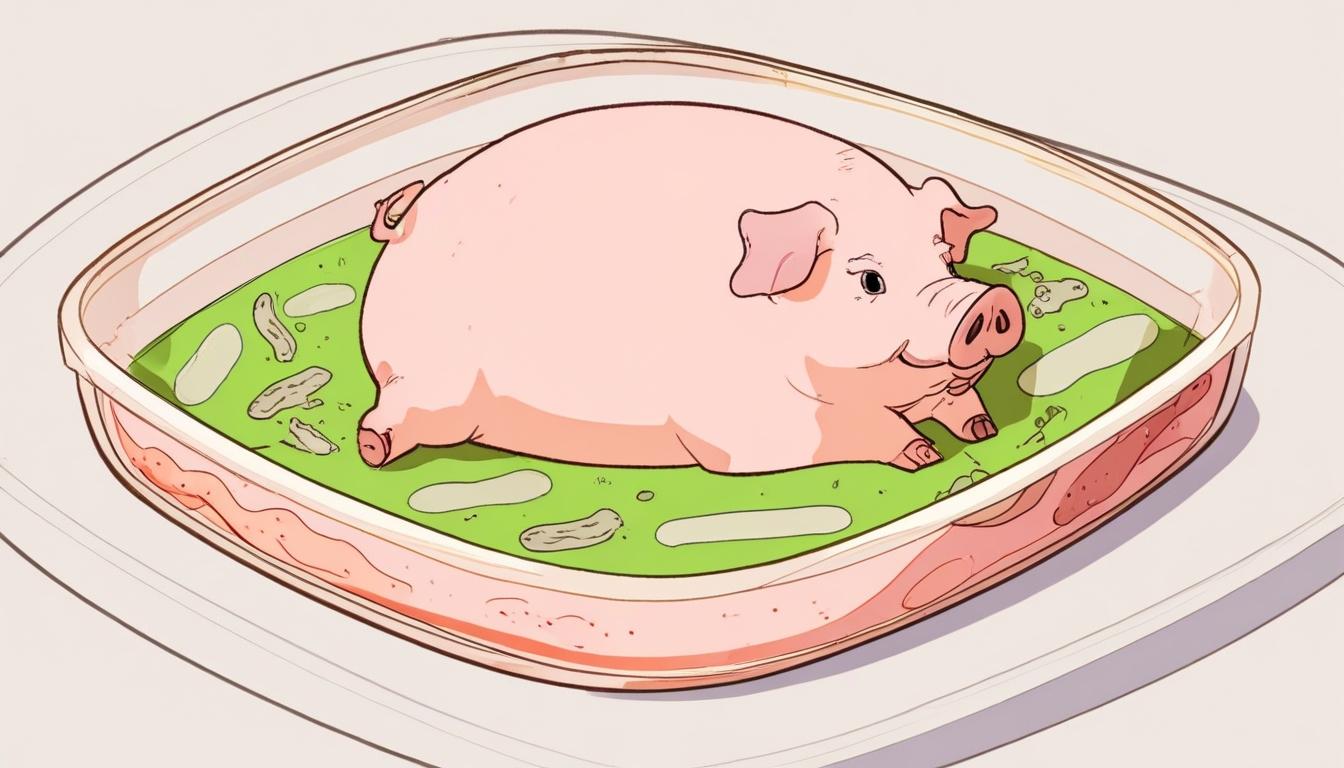Researchers at the University of Edinburgh’s Roslin Institute have developed FaTTy, a pig fat cell line capable of infinite reproduction without genetic modification, promising scalable, cost-effective cultivated pork for Earth and space missions.
Scientists at the University of Edinburgh’s Roslin Institute have unveiled a groundbreaking advancement in cultivated meat production with the creation of a unique pig fat cell line, dubbed FaTTy. This innovative cell line exhibits an unprecedented ability to reproduce indefinitely without genetic modification, which may pave the way for cost-effective, scalable manufacturing of cultivated pork that could even support human consumption in space.
The promise of cultivated meat has attracted significant attention in recent years, particularly as societal shifts towards sustainable and ethically produced food continue to gain momentum. The FaTTy cell line, capable of consistently and efficiently producing fat tissue, has been positioned as a potential game-changing element in this industry. According to the researchers’ publication in the NPJ Science of Food journal, these cells have remarkably maintained a high adipogenic efficiency—nearly 100%—over an extensive culture period, enabling the production of fat that closely resembles natural pig fat, but with healthier fat profiles.
Eitan Fischer, CEO of cultivated pork startup Mission Barns, emphasises the critical role of fat in culinary experience. In his view, “Consumers won’t eat food that isn’t absolutely delicious… fat is the main driver of flavour and juiciness.” The significant bottleneck in cultivated meat production thus lies in the efficient scaling of cultivated fat; a challenge that FaTTy appears poised to address.
The implications extend beyond terrestrial kitchens to outer space—a burgeoning area of research. Prof. F Xavier Donadeu, principal investigator at the Roslin Institute, noted that cultivated meat might not only revolutionise food production on Earth but could also enable astronauts to enjoy traditional meals like bacon during long space missions. This aligns with the growing interest in sustainable food sourcing for space travel, as evidenced by recent partnerships involving universities and space agencies focusing on producing bio-derived products in microgravity.
In the context of technological advancements, Roslin Technologies has collaborated with the University of Edinburgh and secured support from the Industrial Biotechnology Innovation Centre (IBioIC) to enhance the scalability of pig cell lines for cultivated meat. This collaboration has successfully reduced batch-to-batch variations and slashed the costs of cell culture media by an impressive 61%. Such developments are vital in mitigating key challenges in the UK cultivated meat sector and moving closer to viable, large-scale meat alternatives that do not necessitate traditional animal farming.
In a climate increasingly defined by environmental and ethical considerations, the growing availability of cultivated meat could represent a significant shift in how society approaches food production. Susan Bodie, head of business development for the College of Medicine and Veterinary Medicine at Edinburgh Innovation, shared that there is considerable industry interest in the FaTTy technology. This suggests a promising future where lab-grown meat could not only be delicious but also environmentally sustainable, combining scientific ingenuity with culinary tradition to reshape our diets.
The Roslin Institute’s innovations hold the potential to redefine the landscape of cultivated meat, providing both a delectable alternative and a step towards a more sustainable food future—possibly even in the final frontier of space.
Reference Map:
1. Paragraph 1: Sources [1], [2]
2. Paragraph 2: Sources [1], [3]
3. Paragraph 3: Sources [1], [6]
4. Paragraph 4: Sources [1], [4]
5. Paragraph 5: Sources [3], [5]
6. Paragraph 6: Sources [4], [7]
7. Paragraph 7: Sources [1], [3]
Source: Noah Wire Services
- https://www.greenqueen.com.hk/lab-grown-pig-fat-cells-cultivated-meat-pork-space/ – Please view link – unable to able to access data
- https://edinburgh-innovations.ed.ac.uk/technology/fatty – The University of Edinburgh’s Roslin Institute has developed FaTTy, an immortalized, non-genetically engineered pig cell line capable of consistently differentiating into fat cells with high efficiency. This advancement offers significant potential for large-scale fat production in cellular agriculture, providing a non-GMO solution that could streamline the manufacturing of cultivated meat products. The FaTTy cell line maintains its adipogenic efficiency over extended culture periods, making it a valuable resource for the food manufacturing industry. The technology is available for licensing or co-development opportunities.
- https://www.roslintech.com/news/bringing-home-the-bacon/ – Roslin Technologies, in collaboration with the University of Edinburgh and supported by the Industrial Biotechnology Innovation Centre (IBioIC), has achieved a breakthrough in the cost-effective scale-up of pig cell lines for cultivated meat production. Their innovative approach reduces batch-to-batch variations and cuts the cost of cell culture media by 61%. This advancement addresses key challenges in the UK cultivated meat industry, moving closer to large-scale, sustainable meat production without the need for animal slaughter.
- https://www.heraldscotland.com/business_hq/23047107.scottish-researchers-advance-tech-growing-meat-laboratory/ – Scottish researchers have advanced laboratory-grown meat technology, with proof of concept completed in Scotland. The new approach to generating pig cell lines for cultivated meat has been developed by Roslin Technologies and the University of Edinburgh, supported by the Industrial Biotechnology Innovation Centre (IBioIC). This development addresses a critical bottleneck in the commercial production of lab-grown meat, focusing on cost-effective and scalable cell growth methods.
- https://www.ibioic.com/news-database/from-petri-dish-to-dinner-plate-the-challenges-of-scaling-up-cultivated-meat-production – Edinburgh-based Roslin Technologies, a spin-out from the University of Edinburgh, is making progress in the field of cultivated meat. With support from the Industrial Biotechnology Innovation Centre (IBioIC), Roslin Technologies has developed a new approach to cell generation that minimizes variations between different batches of cells. This method has also reduced the cost of cell culture media by 61%, addressing key challenges in scaling up cultivated meat production.
- https://www.foodanddrinktechnology.com/news/44639/researchers-make-meaty-breakthrough-to-support-cultivated-pork-production/ – Researchers in Scotland have made a significant advancement in demonstrating the cost-effective scale-up of pig cell lines for lab-grown meat production. Roslin Technologies and the University of Edinburgh, with support from the Industrial Biotechnology Innovation Centre (IBioIC), have developed a new approach to cell generation that eliminates variations between different batches of cells. This method has also reduced the cost of cell culture media by 61% and could be scaled for use in industry-sized bioreactors.
- https://www.scotsman.com/news/environment/sustainable-scotland-scots-biotech-firm-is-bringing-home-the-bacon-with-lab-grown-meat-breakthroughs-3877420 – Roslin Technologies, a spin-out from the University of Edinburgh, is a leader in the field of cultivated meat. The company has developed unique technology that uses small samples of animal tissue to create induced pluripotent stem cells, which can self-renew and be used to grow different types of tissue, such as muscle and fat. This technology is the only commercial provider of these cells and supplies its pig cells and specially concocted growing medium to producers of cultivated meat across the world.
Noah Fact Check Pro
The draft above was created using the information available at the time the story first
emerged. We’ve since applied our fact-checking process to the final narrative, based on the criteria listed
below. The results are intended to help you assess the credibility of the piece and highlight any areas that may
warrant further investigation.
Freshness check
Score:
9
Notes:
The narrative focuses on recent advancements in cultivated meat technology, particularly the development of the FaTTy cell line, without any indications of outdated information. The article does not appear to be recycled or reused from older sources.
Quotes check
Score:
8
Notes:
The quotes provided are from current figures in the industry, such as Eitan Fischer and Prof. F Xavier Donadeu. Without specific dates for the quotes, it is difficult to verify their originality, but they are presented in the context of recent developments.
Source reliability
Score:
7
Notes:
The narrative originates from Green Queen, a publication focused on sustainable living, which is not as well-established as major news outlets like the BBC or Financial Times. However, the information is supported by credible sources such as the Roslin Institute.
Plausability check
Score:
9
Notes:
The claims about the FaTTy cell line and its potential for scalable cultivated meat production are plausible and supported by advancements in biotechnology. The idea of using cultivated meat in space aligns with ongoing research in sustainable food sourcing for space missions.
Overall assessment
Verdict (FAIL, OPEN, PASS): PASS
Confidence (LOW, MEDIUM, HIGH): MEDIUM
Summary:
The narrative presents recent advancements in cultivated meat technology with a plausible focus on scalability and sustainability. While the source is not as prominent as major news outlets, the information is supported by credible research institutions and aligns with current trends in biotechnology.













